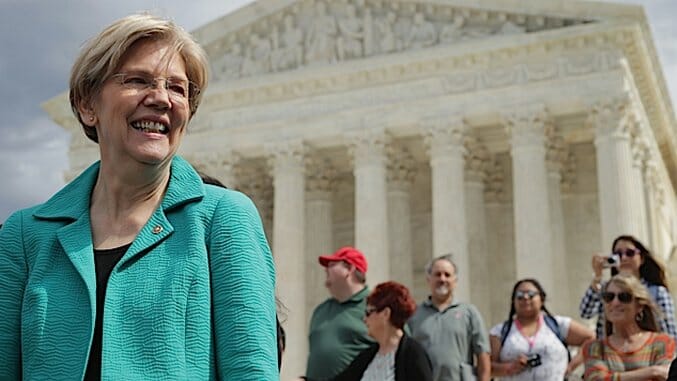Elizabeth Warren is Trying to Unite the Democratic Party, But All She’s Doing is Betraying Progressives
At the time progressives needed her most, she wasn’t there.
Photo courtesy of Getty
Elizabeth Warren is seen by many as the heart of the Democratic Party. She bridges the gap between Bernie Sanders and Hillary Clinton supporters. Both sides have sought her endorsement and have large factions within them that want her as the Vice-President. Given the rise of the ‘Bernie Or Bust’ Movement, Clinton and her allies are looking to Warren as a means of delivering progressive votes in November. However, not even Elizabeth Warren can save the Democratic Party should Clinton win the nomination, and any attempt by her to do so will be seen as betrayal in the eyes of progressives who were already let down when she did not endorse Bernie Sanders.
Lately, Warren has been engaging all-but-certain GOP nominee Donald Trump on Twitter rather than weighing in on the issues dividing Bernie Sanders and Hillary Clinton. This has led many to question if she is coordinating with Clinton’s campaign now that the primary is winding down. Though the campaign denies such coordination, many of Sanders’ followers have been angered by the Massachusetts Senator’s actions, feeling they’re premature.
It seems clear that Warren’s Twitter arguments are an effort to unite the party. There is a general attitude among Democratic Party leaders (and many in the media) that Donald Trump is electoral poison, and no matter how much people don’t like or trust Hillary Clinton, the prospect of The Donald in the White House is so frightening it will bring Democrats together. But this analysis completely misses why Trump (and Bernie) are so popular, and underestimates exactly how discontented people are.
In 1824 populist and political outsider for his time, Andrew Jackson, was denied the White House when Speaker of the House, and presidential candidate Henry Clay threw his support to John Quincy Adams, and was later appointed as Secretary of State. Jackson denounced the result as a “corrupt bargain.” His supporters vehemently agreed, and much to the horror of the political establishment Adams represented, which feared populism as a form of mob rule, and believed the best and brightest should lead, Jackson went on to win in 1828.
Similarly, 40 years later, following the impeachment of President Andrew Johnson, and during Reconstruction, another outsider candidate, former Union General Ulysses S. Grant, won. His presidency was met with derision from the establishment. Henry Adams, the grandson of John Quincy Adams and great-grandson of John Adams, derided Grant as stupid and incompetent. Unlike Adams, he had no pedigree; he was a soldier, not the Harvard-educated heir to a political dynasty. Adams believed the election of the popular Union general was the culmination of years of decay in our system that began with the election of Jackson. He blamed Grant for dashing his aspirations to influence American politics, and restore his family’s sensibilities to the political discourse.
It is hard to look at 2016 and not hear echoes of this history — but not in so far as Trump will bring about another Trail of Tears (he wouldn’t be able to even if he tried) or corruption on par with that of Grant’s administration. No, the comparison is this: Americans are unhappy, the political establishment is complacent, and populism is on the rise.
-

-

-

-

- Curated Home Page Articles By Test Admin October 21, 2025 | 3:10pm
-

- Curated Home Page Articles By Test Admin October 21, 2025 | 2:57pm
- Urls By Test Admin October 21, 2025 | 2:57pm
- Curated Home Page Articles By Test Admin October 21, 2025 | 2:55pm
-

-

-

-

-

-

-

-

-

-

-

-

-

-

-

-

-

-

-

-

-

-

-

-

-

-

-

-

-

-

-




































